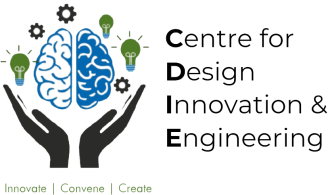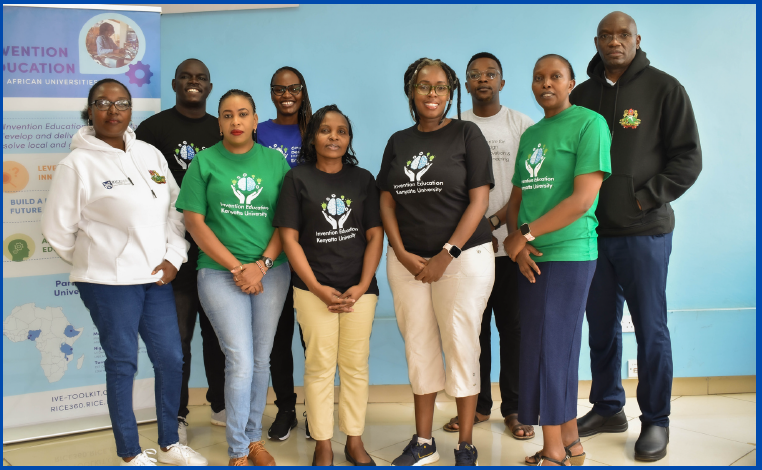Editorial- Dr. Madete
Kenyatta University (KU) is poised to take a giant leap in healthcare innovation, thanks to a
transformative partnership with Rice360 in the United States.
The Invention Education (IvE) program at Kenyatta University allows students and faculty to improve
healthcare by creating and implementing inventions that address local and global issues through
international cooperation among universities, industries, hospitals, and non-profit organizations.
The University, alongside Rice360 and with funding from the Lemelson Foundation, launched a
foundational project in Kenya to explore Universities meaningful involvement in the national innovation
ecosystem.
In this foundational effort, the team worked with stakeholders from universities and the broader
innovation community to:
(i) Determine invention education priorities that would significantly impact the local innovation
ecosystem,
(ii) Interact with stakeholders outside of university contexts (such as industries, innovation
hubs, regulatory authorities, and funders) to grasp their distinct goals, needs, and
opportunities that could enhance collaboration with universities in Kenya, and
(iii) Bring together invention education and innovation stakeholders to formulate and share a
plan of action that encourages greater university involvement in Kenya in the innovation
ecosystem.
From these discussions, two main priorities emerged for expanding IvE in Kenya:
1. Reforming the curriculum to align with local contexts to inspire students to tackle regional
challenges. Furthermore, practical content delivery methods can help close the gap between
theory and practice for graduates entering the workforce. Input from industry partners is crucial
for establishing university curriculum priorities, which should focus on entrepreneurship to
prepare students for future employment opportunities.
2. Developing partnerships within the innovation ecosystem is essential for maintaining a thriving
environment that promotes human-centered and relevant innovation. Implementing
progressive strategies for collaboration with the innovation ecosystem is necessary to help
transfer innovations from academic settings.
Drawing from the insights gained during this foundational phase, the team aimed to create the
curriculum and outline our network to foster innovation. The following strategies will facilitate
curriculum transformation and enhance university engagement with the innovation ecosystem:
1. Provide infrastructure for hands-on, project-based learning to address the technical skills gap
between academia and the innovation ecosystem.
2. Utilize active learning methods found in invention education to empower student innovators.
3. Implement cross-institutional strategies for faculty and industry collaborations.
A New Dawn – Medical Device Innovation Program at Kenyatta University
In the glaring gap of skilled medical technology and healthcare professionals globally, the Biomedical
Engineering Program at Kenyatta University was conceived to meet the urgent need for these skills.
Aligned with the United Nations Sustainable Development Goals (SDG), specifically Goal 3 (Good Health
and Well-being), Goal 4 (Quality Education), and Goal 9 (Industry, Innovation, and Infrastructure), the
Bachelor of Science in Biomedical Engineering was officially launched in September 2013.
The inaugural class graduated in 2018, and since then, we have witnessed a graduating cohort each
year with students consistently producing impressive final-year projects and innovative ideas throughout their
studies. However, many of these innovations remain within university laboratories, failing to address
real-world societal challenges.
This scenario highlighted a significant disconnect between academia and industry. Despite the wealth of
innovative academic projects, their impact was limited due to a lack of industry integration. To address
this gap, Kenyatta University and Rice360 collaborated on a proposal, leading to the implementation of
Phase One of the Invention Education (IvE) project in 2022, funded by the Lemelson Foundation.
The outcomes of Phase one confirmed the existing disconnect. It was evident that developing true
innovators required full industry involvement and engagement from other stakeholders at every stage,
from curriculum development to implementation.
Building on this realization, the Master of Science in Medical Device Innovation program was proposed,
mirroring the Global Medical Innovation (GMI) program at Rice University. This new program is currently
undergoing approval and is expected to launch in September 2025. We believe this initiative will not
only bridge the gap between academia and industry, but also drive the development of practical
healthcare solutions that directly benefit society.
It is exciting to envision how this program could transform healthcare innovation in the country, region
and indeed globally.
Benchmarking Impact – Insights into Our Medical Device Innovation Curriculum
The development of our Master of Science in Medical Device Innovation curriculum has been a
collaborative effort, informed by some of the world’s top biomedical engineering programs. We
benchmarked against Stanford, NYU, Johns Hopkins, the University of Cape Town, and Addis Ababa
University, ensuring an incorporation of global best practices while addressing Kenya’s unique
healthcare challenges.
We have closely modelled on Rice University’s top-ranked bioengineering curriculum—leveraging their
expertise as our implementing partners—we have tailored our program to fit Kenya’s healthcare and
innovation ecosystem. This curriculum sits at the intersection of medicine, business, and engineering,
equipping students with a well-rounded skill set.
Additionally, our curriculum is bridging the gap on the lack of a clear regulatory pathway for medical
devices. This has been done by introducing a Regulatory Systems course that explores global regulatory
frameworks, Kenya’s evolving landscape, and potential future pathways. Students will critically analyse
existing models and propose strategies for regulatory advancement.
Embedding Entrepreneurship and Industry Linkages
This program has integrated entrepreneurship and invention education, to ensure students are learning
how to navigate intellectual property, business models, and venture funding in an endeavour to bring
their technologies to market.
At the heart of the curriculum is a strong industry connection, which has been co-designed with input
from hospitals, manufacturers, and regulators. This is to ensure that students work on real-world
challenges while benefiting from mentorship by clinical and industry professionals. Through industry
seminars, needs-finding exercises, and professional exposure, we align academic training with market
demands.
A Hands-On, Project-Based Approach
Our program emphasizes team-based, project-driven learning, where students tackle real healthcare
challenges under clinical and industrial mentors. This ensures they graduate with both theoretical
knowledge and hands-on experience in designing, developing, and implementing medical technologies.
By merging global insights with local needs, we are shaping the next generation of biomedical
innovators and employees poised to transform healthcare in Africa and beyond.
The program is in the final stages of approval and is poised to start in August 2025.


